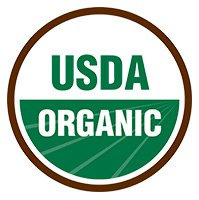This may be correct for most of those, but in the US at least, to label a food as “Organic” it must meet the USDA requirements to get that label.
“Produce can be called organic if it’s certified to have grown on soil that had no prohibited substances applied for three years prior to harvest. Prohibited substances include most synthetic fertilizers and pesticides.”
“As for organic meat, regulations require that animals are raised in living conditions accommodating their natural behaviors (like the ability to graze on pasture), fed 100% organic feed and forage, and not administered antibiotics or hormones.”
http://blogs.usda.gov/2012/03/22/organic-101-what-the-usda-organic-label-means/
It would have to have this label. 
